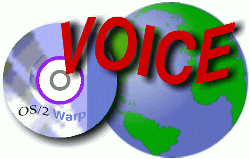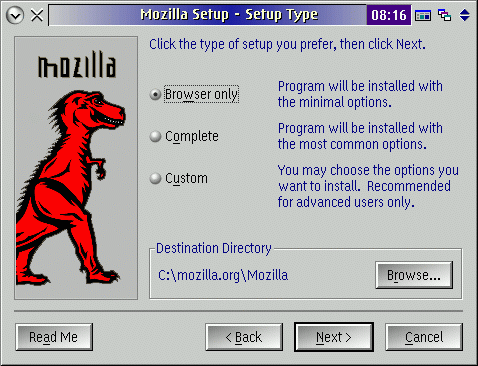
VOICE Home Page: http://www.os2voice.org
[Newsletter Index]
[Previous Page] [Next Page]
[Feature Index]

VOICE Home Page: http://www.os2voice.org |
October 2002
[Newsletter Index]
|
An editorial view from Mark Dodel.
This past month has seen the release of two new web browser versions for OS/2. Opera 5.12 for OS/2 was released September 4th, and Mozilla for OS/2 1.2a was released September 13th. Each has some major improvements and benefits. In both cases it is important to the survivability of OS/2 and eComStation that development continues.
For Opera we get more stability in this latest version and the ability to run win32 plugins. This is also the first version that can be registered to eliminate the banner ads. For now Opera continues with an MDI only interface (all child windows only within the main window), but according to the readme a multi-window option is being worked on. I was disapointed that the Flash win32 plugins (both 5.0 and 6.0 releases) hang my systems which have either a Crystal sound chipset or an OPL-S3 chipset. So plugins still need some work. I've registered my copy of Opera to show my support for the continued development of this application for OS/2, and I think you should consider doing so as well.
Mozilla for OS/2 1.2a was released as well. The major new feature of this release is the new installer which allows you to select some or all of Mozilla's features you want to install. So its up to you if you want the whole enchilada or a much slimmed down version.
 You
can select to just install the browser, install everything or do a custom install.
WIth the custom setup, you can select or ignore items like Mail/Newsgroups, Chatzilla
(the Mozilla IRC client), Debugger, Personal Security Manager, Type Ahead Find and
Inspector. Navigator (the web browser itself) is not unselectable. Youare also given
the options to set Mozilla as your systems default browser and also to associate
HTML files with Mozilla.
You
can select to just install the browser, install everything or do a custom install.
WIth the custom setup, you can select or ignore items like Mail/Newsgroups, Chatzilla
(the Mozilla IRC client), Debugger, Personal Security Manager, Type Ahead Find and
Inspector. Navigator (the web browser itself) is not unselectable. Youare also given
the options to set Mozilla as your systems default browser and also to associate
HTML files with Mozilla.
So what does this customization feature mean? A Complete install of Mozilla for OS/2 1.2a uses about 22.9 MB of disk space. It also uses 28 MB of system memory when initially loaded. With the Browser Only option, Mozilla/2 uses about 18 MB of disk space and 26 MB of system memory. Using the Custom install option, and only selecting to install Navigator uses only about 16.8 MB of disk space and 25 MB of system memory. In all three cases Mozilla takes about 55 seconds to fully load (no turbo mode) on my K6-2 333MHz laptop.
In comparison, Opera 5.12 for OS/2 uses about 19MB of disk space, only 15 MB of system RAM and only takes about 30 seconds to load a web page. Netscape Communicator 4.61 is the lightest of the bunch using 17.5 MB of disk space (Don't forget to clear your cache before guaging this), 11 MB of system memory and loads a web page in about 23 seconds on the same laptop. But Communicator is starting to show its age, and has problems viewing some web pages that were written to the newer standards supported by Mozilla and Opera. So with these three browsers you can make your own choice and get the best view possible of the World Wide Web.
Mike Kaply, the project lead for both Mozilla for OS/2 and IBM's Web Browser which is based on the Mozilla code, will be giving a presentation on these browsers at this months Warpstock event in Austin, Texas. Hopefully I will see you there and we can learn where he sees the future of web browsing headed and what's in store for OS/2 based browsers. If you want to learn more about the Warpstock event in North America this year, please see http://www.warpstock.org. And lets not forget the other Warpstock event, coming up in November, Warpstock Europe. You can read more on this in this issue Warpstock Europe - the other annual OS/2 event.
VOICE Newsletter Update: The planned page for free small advertisements by freeware authors and OS/2 users is going to become part of the VOICE home page soon. Its delayed as our webmaster has just relocated and isn't as yet back up to full speed yet. If you are interested, please contact us at ads@os2voice.org.
We are always interested in your thoughts and views on subjects related to OS/2, and would like to see opinion/editorial pieces as well as hardware/software reviews and HowTo articles. If you can help by writing an article please contact me at editor@os2voice.org.
Our Newsletter team is in need of backup. A few people have joined after we published a call for help in one of the last issues, but we could do with some more. To be able to help you don't have to be a very good translator or HTML programmer. If you have profound knowledge of English or German spelling and grammar, you can also help with editing the articles. Some hints on translation activities are also available in the FAQ.
Warp Doctor: Have an idea for Warp Doctor? You can send your comments directly to the Warp Doctor web guy Jeremy at rs@fyrelizard.com or better yet attend one of our Warp Doctor Team meetings, weekly on IRC.
Everyone's help is required to keep this project going. Please note the change in schedule. The team meets every other Sunday at 3PM EST (19:00 GMT) now, starting with , on IRC in the #warpdoctor channel on the WEBBnet IRC network. For more information on attending online IRC meetings please see the VOICE Meeting Information page - http://www.os2voice.org/meetinginfo.html.
VOICE Online Update: This month the general member meetings are scheduled on October 7 and 21 at 8PM EST (00:00 GMT). Everyone interested in OS/2 or eComstation is invited to attend either or both of these sessions. For more information on attending online VOICE IRC meetings please see the VOICE Meeting Information page - http://www.os2voice.org/meetinginfo.html.
If you have an idea for a Speakup event, please submit it to liaison@os2voice.org, and we will try to schedule something. As always, please be sure to check out the updated VOICE Future events Calendar in this newsletter or on the VOICE website at http://www.os2voice.org/calendar.html for more details on future VOICE events.
This month Thomas Klein returns with part two of DrDialog, or: How I learned to stop worrying and love REXX. He continues with his overview of development of REXX programs with GUI using the free development environment DrDialog by IBM. This should be interesting for anybody, especially for those who have always wanted to write their own OS/2 applications, but were afraid of the high learning curve of PM programming.
Next up we have an article on jetty:// - 100% Java Servlet programming under OS/2. Our anonymous suthor shows us there is a way to do good Java programming under OS/2-eComStation.
This year Warpstock Europe is in Arnhem, Holland, the weekend of November 8-10. Gerrit Schoenmaker gives us a preview of what to expect at Warpstock Europe - the other annual OS/2 event.
Then Michael W. Cocke tells us a lot about using OS/2 based applications to run your own Internet services in How to create your own (small) ISP, in 3 easy (and 57,245 difficult) steps. Part 1, Part 2 and Part 3.
Finally we have the VOICE Newsletter OS/2 Tips page and the Letters, Addenda, Errata page. If you have any OS/2 or eCS tips you've uncovered, please send them to tips@os2voice.org. If you have any comments or suggestions about the newsletter or articles in it, please send them to editor@os2voice.org.
That's it for this month. Upcoming articles include an article on Netbios over TCP/IP (TCPBEUI) under OS/2, by Mike Cocke, an update by Alfredo Fernßndez Díaz of his July 2000 article on the current state of booting OS/2 from a CD, a review of a USB memory card reader by Mark Dodel and the next articles in the series on DrDialog.
Mark Dodel, Christian Hennecke and Jason R. Stefanovich
VOICE Newsletter editors
[Feature Index]
editor@os2voice.org
[Previous Page] [Newsletter Index] [Next Page]
VOICE Home Page: http://www.os2voice.org